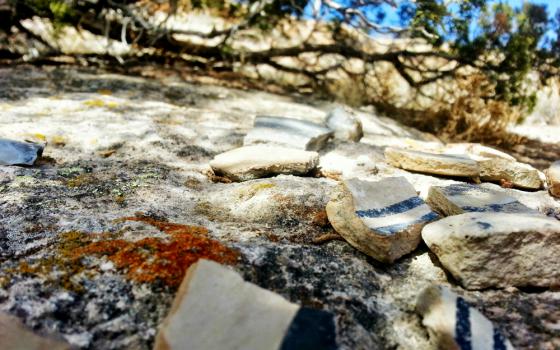If every person of goodwill had a nickel for every negative word we heard or every negative newspaper headline we read last year, we could afford to shelter the homeless. We could feed the hungry.
Here in the United States, the tragedy of 9/11 seemed to open a Pandora's box of fear and violence that is still with us today. The level of toxicity of political invective and the divisions among people have continued to rise. Has it infected us? Have we contributed to it?
Just think of how many ways we have to express our divisions: left/right, liberal/conservative, Christian/Muslim, Democrat/Republican, traditional/progressive, black/white, pro-life/pro-choice.
There are groups dedicated to dividing us. In 2015, there were 892 hate groups in the United States, according to the Southern Poverty Law Center. The number rose to 917 in 2016.
Even our church has deep divisions on many issues. But in his book The Holy Longing, Ronald Rolheiser reminds us:
To be an apostolic community is not necessarily to be with others with whom we are emotionally, ideologically, and otherwise compatible. Rather it is to stand shoulder to shoulder and hand in hand, precisely with people who are very different from ourselves and, with them, hear a common word, say a common creed, share a common bread, and offer mutual forgiveness and in that way to bridge our differences.
A wise priest I knew used to say that the church is like a baseball game: Some players are at home plate, other players are in center field, and others are out in left or right field, but they are all in the ballpark playing the same game, and they are all essential to that game.
And what divides us in our families and communities? What separates "me" from "us"? Old hurts, unresolved differences, a thoughtless word not forgotten? Some members of my own family were world-champion grudge-holders and wouldn't talk to the other party for years, long after everyone else had forgotten what the fuss was all about. I always wondered if even the grudge-holders themselves remembered.
I am especially attracted to Pope Francis' often-repeated call to be bridge-builders. Throughout his papacy, in his role as pontifex ("bridge builder"), he has reached out to the margins — the "peripheries," as he calls situations of conflict, injustice, suffering and exclusion. What would it take for us to build bridges within our own family, community, church, society?
An ancient New Year's custom of some Native American Pueblo tribes was to take all the old pottery out of the house, break it at the town dump, and use only new pots for the next year. Wouldn't it be great to take out all our old cracked and chipped "stuff" to the trash heap and start over?
Lent might be a good time to do it. And then maybe we could model forgiveness, peace and unity to our cracked and chipped church and world.
Do you have good stories or reflections about Lenten spirituality, sisters, or religious life? Email Sr. Michele Morek at mmorek@ncronline.org or call her at 816-968-2232.
[Ursuline Sr. Michele Morek is Global Sisters Report's liaison to U.S. sisters.]

